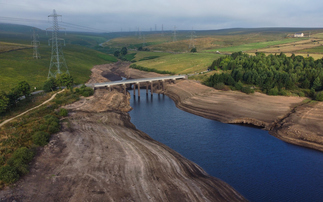The recent paper suggesting a 4C warming scenario justifies continued inaction on cutting emissions marks a worrying development in the never ending 'climate wars'
How much easier would things be if we could fast forward to the end of an argument? If we could get down to the brass tacks of competing positions right away and do away with the years, the decades, of pointless posturing and debating club back-and-forth.
Imagine a world where certain leading Brexit campaigners had admitted from the off - as they are starting to do now - that they regard pretty much any level of economic disruption as acceptable if we secure a perceived increase in sovereignty, and that they are utterly indifferent as to whether or not there is a hard border between Ireland and Northern Ireland.
Imagine if certain Republicans cut to the chase and just admitted - as they are starting to do now - that they don't regard credible accusations of sexual assault as a big deal, but they do regard having a furiously partisan political operative on the Supreme Court as a desirable outcome.
Imagine if certain climate sceptics had admitted years ago - as they are starting to do now - that there is a credible risk of human-induced, epoch-shaping warming within the lifetime of people alive today, but they just don't want to do anything about it.
On that last one, it has been decades coming, but we are starting to see real progress.
The news last week that the Trump administration has - in the depths of a 500-page report on its attempts to freeze vehicle emission standards - acknowledged we are on track for 4C of warming above pre-industrial levels this century, but that this potentially catastrophic scenario justifies continued inaction feels like an important new development in the 'climate wars'.
Here is official recognition that anthropogenic warming could unleash a change in global temperatures comparable to the difference between the last ice age and now comfortably within the lifetime of people alive today. This stance is further echoed in the leaked US comments on next week's upcoming IPCC report, seen by Climate Home News, which provide a remarkably confused and contradictory critique, questioning the accuracy of climate models one minute and then insisting the final paper stresses quite how gargantuan a task it is to keep temperature increases below 1.5C the next, presumably based on said models, before then arguing the world simply develop its way out of climate impacts.
Taken together, the Trump administration is clearly finessing what could become the most dangerous climate sceptic trope yet: the idea that hugely dangerous climate change is likely happening, but it is too late to put a meaningful dent in rising global temperatures, so we might as well give up any attempts at trying.
To shoot off on a brief tangent, there is a lot of debate currently about where the division in politics now lies: left vs right, liberal vs illiberal, open vs closed. But is a better explanation the way in which a line has been drawn between those of left and right who embrace extreme levels of risk and those who remain more risk averse?
This point was always inevitable. The history of climate 'scepticism' is one of retreat. With apologies to the various offshoots and factions, it goes something like this: climate change isn't happening; then climate change is happening, but mankind is not causing it; then climate change is happening, mankind is causing it, but only part of it and other factors are more important; then climate change is happening, mankind is causing most of it, but it won't be that serious and may even be beneficial; and then climate change is happening, mankind is causing most of it, it could be serious, but we can adapt. Until finally we reach today's Trump administration endorsed stance, which is tricky to unpick but looks something like: climate change is happening, mankind is causing most of it, it could be very serious, but any single attempt to tackle it will cost too much and won't make much difference, so why bother?
As with most things, Trump himself has rattled his way through a raft of differing positions, labelling climate change a Chinese "hoax", acknowledging it is real and insisting he has an "open mind" on the causes, admitting he sees "some connectivity" between emissions and temperatures, and overseeing officials who now sneak references to 4C of warming into documents and seek to prioritise adaptation in international reports.
To adapt the old joke about military forces you don't rate, 'how many climate sceptics does it take to defend a discredited talking point? Answer: They don't know, they've never really tried'.
This should be a moment of celebration for climate hawks. In continuing their retreat to acknowledge climate risks and embrace a form of defeatism over decarbonisation efforts, the Trump administration has finally exposed the core argument that has remained at the heart of climate 'scepticism' through all its manifestations: that action to tackle carbon emissions is too expensive, that it is technologically and economically unfeasible, and policies to try and make it feasible are either ineffective of immoral.
Everything springs from this starting point. As the critical line in that 500 page report justifying doing nothing to improve US vehicle efficiency states: having a meaningful impact on global emissions levels "would require substantial increases in technology innovation and adoption compared to today's levels and would require the economy and the vehicle fleet to move away from the use of fossil fuels, which is not currently technologically feasible or economically feasible".
And yet they set out this hypothesis when it too is under siege. When reams of credible evidence shows how improving vehicle fuel efficiency actually boosts an economy, when our understanding of the net impact of air pollution on our health and productivity has never been clearer, when the cost of low emission vehicles is plummeting towards the point where they become cheaper to buy and run than conventional vehicles. The cost and technology argument is being deployed by opponents of climate action at the point when reductions in costs and advances in technology are starting to make it null and void.
So why would celebrations from climate hawks be premature? Because even as the technical arguments are won, the advance of US government-endorsed climate defeatism remains an extremely dangerous new development. It points to how even as the technologies and economics are tilted in favour of decarbonisation climate sceptics can continue to block progress, how they can establish a new narrative whereby high carbon infrastructure is maintained even as temperatures spiral past dangerous levels.
The one killer argument against almost all climate sceptic talking points has always been 'what if you are wrong?' This question breaks debating club best practice in that it accepts your opponents' priors. It requires climate hawks to go first and acknowledge what happens if they are wrong? What if climate impacts are non-existent or minimal or manageable? What if clean technologies don't work or leading to higher costs? Well? What then?
The answer is we would misallocate some capital as we sought to decarbonise too fast. Energy costs may be higher than they could have been in some economies and some people may see access to energy deferred with all the fuel poverty and development impacts that implies. There would be significant negative consequences, although they could be offset to a considerable degree by co-benefits associated with rapid decarbonisation: reduced air pollution, less energy price volatility, improved energy security, the early delivery of emissions reductions that even so-called 'lukewarmer' climate sceptics acknowledge we will probably need to achieve at some point this century or next, and the creation of new clean tech industries which look as if they will curb long term energy and fuel costs in many parts of the world.
This scenario may be economically sub-optimal, but the problem for climate sceptics who invoke it is it pales in comparison to the consequences that would be unleashed if they are wrong and rapid warming over the coming decades unleashes rising sea levels, soaring extreme weather risks, and food insecurity, as every science academy, insurance company, and respected security body on the planet expects. It is a case of a modest drag on global economic growth with some wider environmental benefits vs a global economic and environmental crisis of unprecedented proportions. It is an unnecessary attempt to avert a 4C world vs a 4C world itself. The risks associated with the two scenarios differ in their seriousness and the damage they could wreak by an order of magnitude.
(Coincidentally, after I wrote this I ended up having this very debate with the GWPF climate sceptic think tank on Twitter yesterday. It speaks volumes that they repeatedly refused to answer the question about whether they ever consider what happens if their analysis of climate impacts and risks is wrong)
The danger in the Trump administration's new tactic is it accepts this 4C world is entirely possible, but then asserts that it either does not care or thinks it is too difficult to do anything about it. There is no acceptance that the costs of decarbonisation are surmountable or may even result in net benefits. There is no willingness to beef up R&D spend to try and make the deep decarbonisation easier. There is no acknowledgement that each emission reduction policy on its own will have a negligible impact but that a suite of decarbonisation policies could help drive a low carbon transition. There is simply the insistence that the scale of emissions reductions required are "not currently technologically feasible or economically feasible".
It is an acknowledgement that it becomes impossible to keep dismissing climate impacts when heatwaves bite and your seaboards are being batteredby storms. But it is also a 'wait and see' placeholder at a time when scientists are about to warn we've got about a decade left to avoid potentially disastrous climate impacts.
Like previous climate sceptic positions, this stance is unsustainable. It will be overtaken by the plummeting clean tech costs that are already making the low carbon transition technologically and economically feasible. There will no doubt be other positions in the future, probably centred even more explicitly on the core motivation: the defence of the sunk costs and jobs of high carbon industries, and the 'freedom-loving' philosophical rejection of policies that require anyone to consider and act on externalities and long term responsibilities.
But for now the suggestion that dangerous levels of climate change could well happen, coupled with the siren voices insisting we can simply adapt to these impacts, remains a dangerous trope, capable of countering one of the strongest climate hawk arguments - 'what happens if you are wrong?' - with an insouciant shrug of the shoulders, a 'so what?'. It's a dismissal of the risks even more brazen than that which has gone before. It is an exercise in Trumpian power that could distract governments and businesses, while making a perverse common cause with those environmentalists who also fear it is too late to halt runaway warming.
It would be nice to fast forward to the end of these 'debates', to see US officials one day revert to the basic principles of risk management, long term security, and rational discourse that were once the norm. But sadly we are not there yet. The fight to demonstrate that these risks are real and serious and that the path for mitigating them is both viable and attractive goes on.









